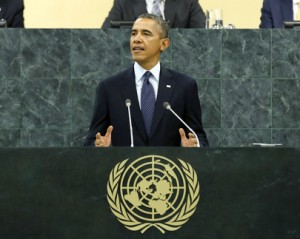Source: Consortium News
Last August, the Obama administration lurched to the brink of invading Syria after blaming a Sarin gas attack outside Damascus on President Bashar al-Assad's government, but new evidence -- reported by investigative journalist Seymour M. Hersh -- implicates Turkish intelligence and extremist Syrian rebels instead.
The significance of Hersh's latest report is twofold: first, it shows how Official Washington's hawks and neocons almost stampeded the United States into another Mideast war under false pretenses, and second, the story's publication in the London Review of Books reveals how hostile the mainstream U.S. media remains toward information that doesn't comport with its neocon-dominated conventional wisdom.
In other words, it appears that Official Washington and its mainstream press have absorbed few lessons from the disastrous Iraq War, which was launched in 2003 under the false claim that Iraqi dictator Saddam Hussein was planning to share hidden stockpiles of WMD with al-Qaeda, when there was no WMD nor any association between Hussein and al-Qaeda.
A decade later In August and September 2013, as a new war hysteria broke out over Assad allegedly crossing President Barack Obama's "red line" against using chemical weapons, it fell to a few Internet sites, including our own Consortiumnews.com, to raise questions about the administration's allegations that pinned the Aug. 21 attack on the Syrian government.
Not only did the U.S. government fail to provide a single piece of verifiable evidence to support its claims, a much-touted "vector analysis" by Human Rights Watch and the New York Times -- supposedly tracing the flight paths of two rockets back to a Syrian military base northwest of Damascus -- collapsed when it became clear that only one rocket carried Sarin and its range was less than one-third the distance between the army base and the point of impact. That meant the rocket carrying the Sarin appeared to have originated in rebel territory.
There were other reasons to doubt the Obama administration's casus belli, including the irrationality of Assad ordering a chemical weapons strike outside Damascus just as United Nations inspectors were unpacking at a local hotel with plans to investigate an earlier attack that the Syrian government blamed on the rebels.
Assad would have known that a chemical attack would have diverted the inspectors (as it did) and would force President Obama to declare that his "red line" had been crossed, possibly prompting a massive U.S. retaliatory strike (as it almost did).
Plans for War
Hersh's article describes how devastating the U.S. aerial bombardment was supposed to be, seeking to destroy Assad's military capability, which, in turn, could have cleared the way to victory for the Syrian rebels, whose fortunes had been declining.
Hersh wrote:
"Under White House pressure, the US attack plan evolved into 'a monster strike': two wings of B-52 bombers were shifted to airbases close to Syria, and navy submarines and ships equipped with Tomahawk missiles were deployed."'Every day the target list was getting longer,' the former intelligence official told me. 'The Pentagon planners said we can't use only Tomahawks to strike at Syria's missile sites because their warheads are buried too far below ground, so the two B-52 air wings with two-thousand pound bombs were assigned to the mission. Then we'll need standby search-and-rescue teams to recover downed pilots and drones for target selection. It became huge.'
"The new target list was meant to 'completely eradicate any military capabilities Assad had,' the former intelligence official said. The core targets included electric power grids, oil and gas depots, all known logistic and weapons depots, all known command and control facilities, and all known military and intelligence buildings."
According to Hersh, the administration's war plans were disrupted by U.S. and British intelligence analysts who uncovered evidence that the Sarin was likely not released by the Assad government and indications that Turkey's intelligence services may have collaborated with radical rebels to deploy the Sarin as a false-flag operation.
Turkey's Prime Minister Recep Erdogan sided with the Syrian opposition early in the civil conflict and provided a vital supply line to the al-Nusra Front, a violent group of Sunni extremists with ties to al-Qaeda and increasingly the dominant rebel fighting force. By 2012, however, internecine conflicts among rebel factions had contributed to Assad's forces gaining the upper hand in the conflict.
The role of Islamic radicals -- and the fear that advanced U.S. weapons might end up in the hands of al-Qaeda terrorists -- unnerved President Obama who pulled back on U.S. covert support for the rebels. That frustrated Erdogan who pressed Obama to expand U.S. involvement, according to Hersh's account.
Hersh wrote:
(Note: You can view every article as one long page if you sign up as an Advocate Member, or higher).






